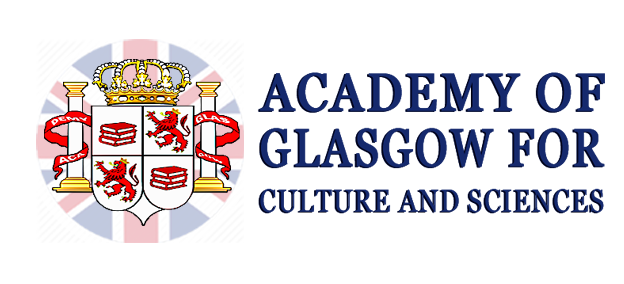ACADEMY OF GLASGOW FOR CULTURE & SCIENCES
Professional Master’s Degree ( MSc. Prof.) of Medicine For
Intensive Care Specialist Physicians
under (course-based (taught) Professional Master’s program)
POSTGRADUATE TAUGHT
CRITICAL CARE MSc/PgDip/PgCert
The care of critically ill patients is a challenging and highly specialised area of health care practice. The polio pandemic in the 1950 s
led to the birth of the modern Intensive Care Unit (ICU). Another pandemic (Covid-19) has seen the term ‘ICU’ rise
to prominence once again as the area in hospital where the most severely ill patients are cared for. Critical Care is a term
that is repeated daily in the media. It is the specialty we practice and are passionate about, and the area of health care we are
dedicated to teaching at the Academy of Glasgow.
MSc: 12 months full-time; 24 months part‑time
PgDip: 6 months full-time
PgCert: 3 months full-time
PROGRAMME STRUCTURE
The programme is delivered at the Academy of Glasgow The MSc has three components:
Three taught courses in the first semester (3 months full time)
Three taught courses in the second semester (3 months full time)
Dissertation or project report in the summer semester (6 months full time)
On a part-time basis, the taught courses could be taken over 12 months and the
dissertation/project could be completed over 12 months.
Part-time students have the flexibility of choosing the three courses during each year of study,
as long as course 1 (research and scientific writing) is chosen first.
The combination will be agreed before study is commence.
The learning and teaching approach is varied and includes lectures and tutorials, seminars, set exercises, simulated
clinical scenarios, and simulated ward round at the critical care floor at the QEUH.
There will be emphasis, for some of the assignments, on reflection, leadership and specific application of new knowledge within
the students’ own working environments giving them a unique and bespoke learning opportunity.
For the MSc component, students can either choose a topic that is related to critical care or write a
report on a project carried out during the year.
It is expected that this work is presented at national and international conferences as well as
submitted for publication.
The programme is suitable for International students. n.b. part time study
CORE COURSES
RESEARCH AND SCIENTIFIC WRITING SKILLS
CAUSES OF MULTI-ORGAN FAILURE
EVIDENCE-BASED QUALITY IMPROVEMENT
MANAGEMENT OF MULTI-ORGAN FAILURE
SEPSIS
CRITICAL CARE GOVERNANCE
CRITICAL CARE: DISSERTATION
Find out more about core and optional courses
Programme alteration or discontinuation
The Academy of Glasgow endeavours to run all programmes as advertised. In exceptional circumstances,
however, the Academy may withdraw or alter a programme. For more information.
ENTRY REQUIREMENTS
The programme is open to doctors, nurses and allied health professionals. Doctors require
completion of the basic foundation programme or equivalent.
The entry requirements are:
A relevant health professional qualification
Current or recent employment within a critical care setting
Normally a minimum of one to two years’ experience in critical care practice
IELTS score as per Academy of Glasgow standard for candidates whose first language is not English.
HOW TO APPLY
To apply for a postgraduate taught degree you must apply online. We cannot accept applications any other way.
Please check you meet the Entry requirements for this programme before you begin your application.
Documents
As part of your online application, you also need to submit the following supporting documents:
Any additional documents required for this programme (see Entry requirements for this programme)
You may save and return to your application as many times as you wish to update information,
complete sections or upload supporting documents such as your final transcript or your language test.
For more information about submitting documents or other topics related to applying to a postgraduate taught programme.
Guidance notes for using the online application
These notes are intended to help you complete the online application form accurately; they are also available within the help section
of the online application form.
If you experience any difficulties accessing the online application then you should visit the Application Troubleshooting/FAQs page.
Name and Date of birth: must appear exactly as they do on your passport. Please take time to check the spelling and lay-out.
Contact Details: Correspondence address. All contact relevant to your application will be sent to this address including the offer
letter(s). If your address changes, please contact us as soon as possible.
Education and Qualifications: Please complete this section as fully as possible indicating any relevant Higher Education qualifications
starting with the most recent. Complete the name of the Institution (s) as it appears on the degree certificate or transcript.
Employment and Experience: Please complete this section as fully as possible with all employments relevant to your course. Additional
details may be attached in your personal statement/proposal where appropriate.
CORE AND OPTIONAL COURSES
- Research and scientific writing (semester 1)
This course will cover the broad topic of scientific research and writing skills. It will commence with the principles of scientific enquiry and study design. Systematic literature searches will be covered as well as basic statistics. Examples of published research in the field of critical care will be explored, critically appraised for relevance, validity, bias and applicability. Students will have the opportunity to carry out structured literature searches and practise their scientific writing skills.
- Common conditions and injuries precipitating multi-organ failure (semester 1)
The aim of this course is to explore common diseases and injuries which can lead to multi-organ failure. In addition it will cover recent evidence and state of the art management of these diseases and injuries in critical care. Clinical teaching will be introduced during this course using simulated clinical cases and ward rounds at the QEUH critical care floor. Opportunities will be given for students to practise oral presentations on a clinical topic.
- Evidence-based Clinical Guideline writing, Clinical Audit and Quality (semester 1)
During this course, the students will learn how to grade the quality of evidence in the published literature related to critical care. They will learn about the process of producing evidence-based guidelines. The principles of clinical audit and quality improvement will be introduced. The students will be given the opportunity to write an evidence-based guideline that is applicable and valid in their own workplace.
- Management of multi-organ failure (semester 2)
During this course the student will learn how to recognise and support the major failing organ systems. The systems covered will include cardiovascular, respiratory, renal, hepatic, gastrointestinal, neurological and haematological. Emphasis will be placed on the interactions and competing challenges when dealing with more than one simultaneously failing organ system. The published literature will be explored including controversies in management of multi-organ failure. During this course the students will be introduced to various organ support devices, and have hands on experience in clinical management, data interpretation and decision-making during simulated clinical scenarios and simulated ward rounds.
- Sepsis (semester 2)
The aim of this course is to provide the student with a detailed insight into various aspects of sepsis. This will include the evolution in concepts and definitions, pathophysiology, diagnosis and management with particular reference to the surviving sepsis guidelines. There will be an emphasis on the practical application of knowledge and reflection of applicability within the students’ own working environment. Students will practise written and oral presentation skills as well.
- Severity Scoring, Morbidity & Mortality review, Ethics and Legal considerations, Management Principles (semester 2)
This course will cover broad aspects of the practice of critical care. The concepts of severity scoring, predicted mortality, standard mortality ratios and national bench-marking will be introduced. The course will also cover reflective practice and the use of morbidity and mortality reviews for learning and education. Ethical and legal aspects of critical care practice will be covered in addition to basic principles of management of a large critical care unit. There will an opportunity to reflect on the impact of these issues on the clinical practice of the student.
Certification Information
While some professional degree programs from ACADEMY OF GLASGOW FOR CULTURE & SCIENCES are designed to prepare students to meet international professional certification requirements, these programs may not necessarily meet the professional degree requirements in other countries.
Students who plan to enroll in international professional degree programs with the intention of obtaining the professional degree in other countries should be familiar with the professional degree requirements in those countries.
Current students who are planning to undertake field experiences abroad should be familiar with the requirements of other countries.
In line with regulations, the Glasgow Academy of Culture and Science makes a good faith effort to determine whether our professional programs leading to professional certificates may meet the requirements of other state licensing boards, and doing so requires contacting your state licensing boards and having those boards reviewed The curricula of the program, which qualifies you to obtain a professional certificate in the specialization you wish to join.
[gravityform id=”34″ title=”true” description=”true”]


